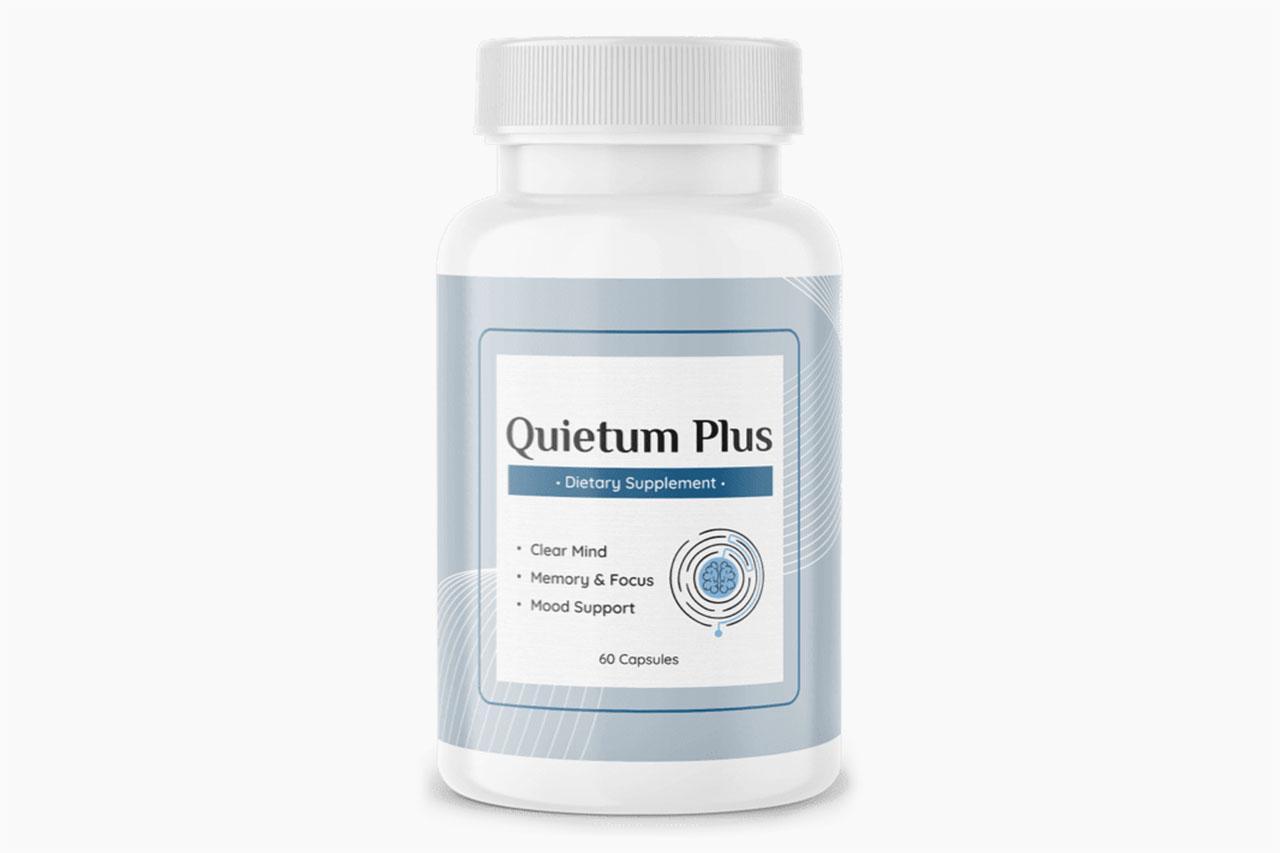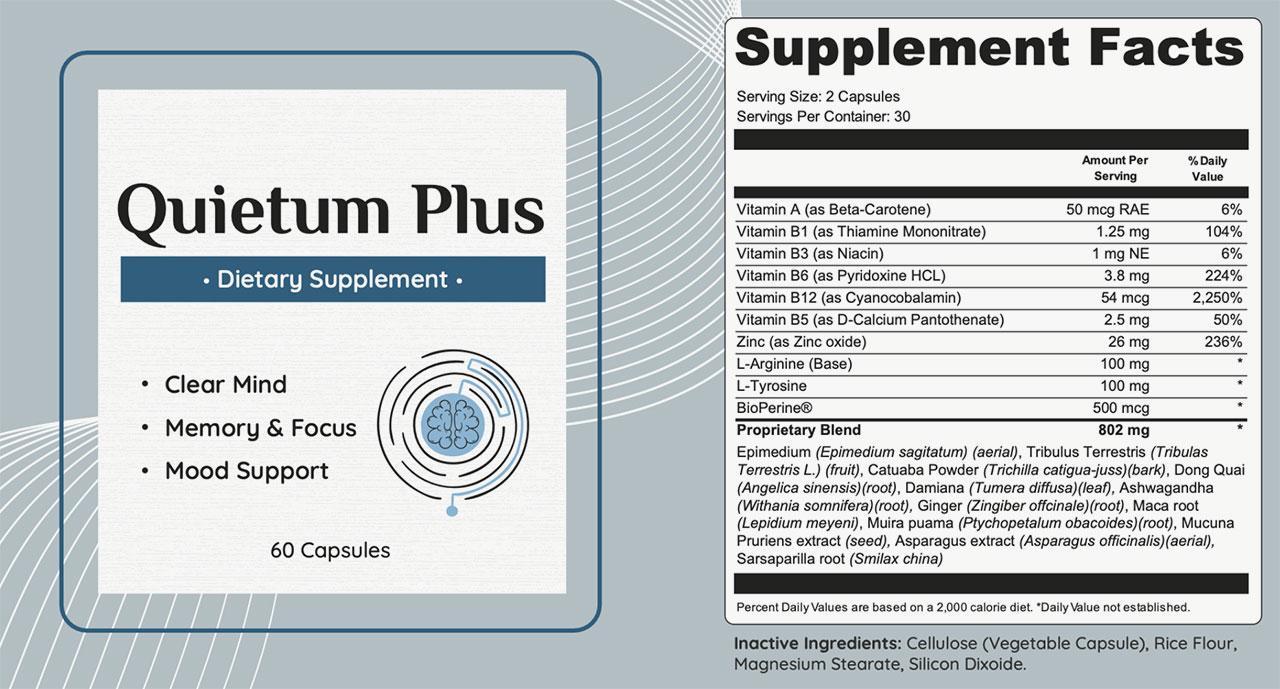Quietum Plus Reviews -

Negative Side Effects to Worry About or Safe Pills?
You're probably finding it difficult to concentrate if you're hearing hissing, whooshing, and buzzing sounds. Do you feel like you're the only one who can hear the sounds? If so, it could be related to a condition known as tinnitus. In this case, the sounds are internal rather than external, exacerbating the situation because people cannot simply dismiss it as usual. While only 15 to 20% of the American population is affected by it, the impact on mental and physical health is tremendous. Bearing everything in mind, what
was once thought to be an issue with hearing has lately been refuted, with the source of tinnitus being identified as our brains. One team claims to have created a formula that supports the brain to liberate people from tinnitus. Want to learn more about the formula? Here’s what you should know about Quietum Plus.
What is Quietum Plus?
Quietum Plus is a natural dietary supplement that seeks to alleviate tinnitus symptoms. In doing so, people can anticipate improved clarity, memory, focus, and a more balanced and positive mood. The strategy used by the solution's creators is mainly based on 18 plants and vitamins with scientific backing. They are convinced that most people will finally enjoy peace every day While the ingredients in this formula play a vital role, we must first acknowledge the founding principles, which will be discussed next at a greater length.
How does Quietum Plus work?
The creators described how OTC medicines do little to quiet what may appear to be progressively louder buzzing, clicking, and hissing sounds. The latter is due to said medicines' inability to treat the underlying cause of tinnitus, which originates in the brain rather than the ear To be more precise, they are referring specifically to this alleged “wire” that transmits electrical signals from the ear”cell”
to our intricate brain networks. The odd sounds are held to be caused by wire damage, which interferes with the brain's processing. In other words, when the brain can't detect familiar sounds, it stimulates unpleasant sounds, which brings us to the infamous tinnitus. Quietum Plus was developed to repair existing damage to the ear-brain link by feeding, regenerating, and rebuilding these connections. Everything will likely be in order as soon as this wire is fixed, enabling the brain to transmit electrical signals and decode signals properly. Now that we've established one theory of tinnitus origins, let's look at how the Quietum Plus formula addresses this problem.
Quietum Plus Is On Sale Now For A Limited Time!
What ingredients are inside Quietum Plus?
The majority of the Quietum Plus formula is contained in its 802mg proprietary blend, which includes ingredients such as:
Horny Goat Weed
Horny goat weed is a plant that belongs to the Epimedium family. This ingredient has traditionally been used in Asian medicine to boost kidney vitality, which is believed to advance sexual function
and fertility. According to research, horny goat weed may help relieve symptoms connected with artery hardening, sexual issues, and hay fever. However, further research is required before making any firm statements. The same could be said about its capacity to improve brain health.
Tribulus Terrestris
Tribulus Terrestris is a small leafy plant native to Europe, Asia, Africa, and the Middle East. Its root and fruit have been used in Traditional Chinese and Ayurvedic medicines to increase libido, preserve urinary tract health, and reduce edema. The creators claim to have selected this ingredient for its ability to regulate neuroinflammation, protect the body from free radicals and promote antidepressant effects. Further investigation revealed that Tribulus Terrestris has antioxidant properties and plays a role in the breakdown of acetylcholine, a naturally occurring neurotransmitter critical for memory, muscle contractions, and sending signals between the different nerves [3]
Catuaba Powder
Catuaba powder is produced from the bark of Brazilian rainforest trees. Catuabines (a category of alkaloids) are thought to alleviate or prevent certain health diseases such as anxiety, asthma, infectious agents, bronchitis, depression, erectile dysfunction, exhaustion, insomnia, low sex drive, obesity, memory issues, and
perhaps skin cancer (depending on the stage). Unfortunately, research on many of these topics is relatively limited, preventing us from generalizing about the larger population. Catuaba has anti-inflammatory, antinociceptive, pro-memory, and neuroprotective characteristics that may be helpful in Quietum Plus, but for the most part, these findings come from studies using rodents [5].
Dong Quai
Dong Quai [6] is a traditional Chinese herb used to alleviate menstruation cramps and menopausal symptoms. In vitro studies have also indicated that it has anti-tumor, pro-apoptotic, anti-metastatic, anti-tuberculosis, neuroprotective, and hematopoietic properties. The same results, however, were not replicated with either animals or humans. Interestingly, one site summarized a study that showed how a dose ranging from 300 to 600mg per kg could improve cognition by lowering neuroinflammation. Furthermore, it may aid in the breakdown of acetylcholinesterase. However, there are a lot of unknowns at the time of writing [7].
Damiana
Damiana, also known scientifically as Turnera diffusa, is a shrub native to Texas, Mexico, South and Central America, and the Caribbean. This ingredient, which contains various chemicals, may alleviate symptoms connected with anemia, bronchitis, female
health changes, coughs, colds, diabetes, fever, fungal infection, gastrointestinal disorders, pain, pulmonary and respiratory diseases, and skin conditions. Since it has antidepressant properties, Damiana may assist in improving general mood, reducing anxiety, and enhancing well-being, based on another source.
Ashwagandha
Ashwagandha is an evergreen shrub primarily used to help the body respond better to stress and anxiety. It has been shown to potentially alleviate symptoms associated with mental health illnesses such as depression, schizophrenia, and potentially bipolar disorder. However, this requires a dose of at least 600mg over a specific period. Furthermore, it is too early to assess its overall efficacy because severity may have been overlooked. In terms of brain health, ashwagandha may assist some people in enhancing their executive functioning, attentiveness, response time, and overall performance in cognitive activities.
SPECIAL OFFER: Get Quietum Plus at Very Affordable Pricing!!!
Ginger
Ginger [11] is a flowering plant whose root is extensively used as a spice. All credit for ginger's therapeutic benefits is attributed to its main component, gingerol. To date, it has been demonstrated to
alleviate discomforts caused by chemotherapy and pregnancy, ease bloating and gas, assist in regulating free radicals, and reduce inflammation. Controlling the latter is crucial because oxidative stress and chronic inflammation may not only hasten the aging process but may also be significant contributors to age-related cognitive impairment. Some data suggest that it can improve reaction time and working memory, but further research is needed.
Maca Root
Maca root is a vegetable native to Peru's Andes area with a long history of use as an hePeru'sedicine. Preliminary research has connected it to increased sexual function, libido, and sperm quality, but like with many ingredients in Quietum Plus, tradition appears to trump science. Limited research suggests that maca root may help increase energy levels and mood, particularly in menopausal and postmenopausal women. In addition to the preceding, rodent studies have revealed that consuming maca root positively affects cognition and motor coordination, implying it could slow age-related decline.
Muira Puama
Muira puama [15] is a small tree native to South America's Amazonian region, whose bark, roots, and leaves have all been utilized for medicinal purposes. To begin with, Muira puama is classified as an adaptogen, a beneficial antioxidant, and is
considered effective at alleviating digestive issues, fatigue, and symptoms related to vitamin deficiency, among other things. A brief investigation of the effects of this ingredient on brain function and cognition found that it boosted memory and inhibited acetylcholinesterase. As mentioned multiple times in this review, the latter is essential for cognition. Its cognition-advancing capacity might have to do with it serving as an antioxidant [16]
Mucuna Pruriens
Mucuna pruriens [17] is a tropical legume. Surprisingly, it is reportedly high in protein and significantly more digestible than most bean varieties. L-dopa is deemed critical of the several chemical compounds stored within this ingredient, as it serves as the precursor for our feel-good neurotransmitter The absence of this neurotransmitter has been linked to several nervous system dysfunctions, the most prominent of which is Parkinson's disease.
Asparagus Extract
Asparagus extract [18] is produced from the asparagus plant's spears, roots, and rhizomes. It has been chiefly used in Ayurvedic medicine to treat urinary tract disorders, diabetes, and high blood pressure. It contains a lot of quercetin, a flavonoid having antibacterial, antiviral, and anti-inflammatory properties. To round off the list, there are vitamins E and C, two of the most potent antioxidants known to neutralize free radicals.
An amino acid known as asparagine might be helpful for Quietum Plus since it is thought to be required for proper brain development. Another benefit being examined is its capacity to help reduce the effects of cortisol and other stress chemicals. As a result, asparagus may reduce the physiological impact of stress (i.e., blood pressure, fatigue, and mental fog).

Sarsaparilla Root
Sarsaparilla is a woody climbing vine in the Smilax genus. It has traditionally been used to treat arthritis, psoriasis, eczema, and dermatitis. However, there is some evidence that it can lessen brain cell damage, particularly in patients with Alzheimer's disease, Parkinson's disease, and other disorders. Thus, further human research is needed to grasp its significance [20] entirely


